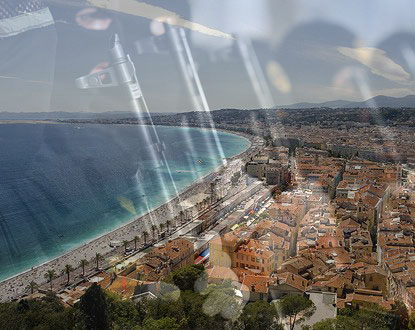A new thorny issue has just surfaced in Nice. In Nice and on the French Riviera, there supposedly exists an organized network operating for the indoctrination and recruitment of young individuals (of Muslim faith or not, and sometimes minors), who are then sent to the Middle East to fight in various ongoing conflicts, particularly in Syria, alongside radical forces.
This is what the mayor of Nice, Christian Estrosi, suggested during a press conference while presenting the testimony of a mother whose son, barely over 18 years old, suddenly disappeared without any apparent reason, just after Christmas. To her knowledge, her son had not converted to Islam and showed no obvious signs of interest or participation in political activities.
Since then, the young man has had some brief contacts with his mother, explaining that he had gone to Turkey and joined a training camp to fight for the “liberation of Syrian women and children.” But who had paid for his trip?
These confused statements also come with a new identity: no longer his baptism name, very French, but that of Abu Issad!
The report of the disappearance to the police apparently led to no action since the young man was no longer a minor and, therefore, legally, could exercise his freedom without having to account for it to anyone (even his own mother).
A first question arises: Is it possible that, due to the nature of the disappearance, the police did not escalate the information to their hierarchy? Moreover, according to the lady, many young people from the Saint-Roch neighborhood have recently taken the same path as her son.
The mayor of Nice reports about twenty requests for help and contacts through which he was approached. According to him, the information he has received estimates that nearly thirty residents of Nice are involved in these paramilitary activities. Additionally, several sites (Garages, businesses…) have been identified as potential meeting places for these activist groups (One can imagine that the mayor of Nice certainly knows more about this sensitive subject).
By this announcement, the first magistrate of the city seeks to alert families and organizations in order to detect potential cases as quickly as possible, making it possible to provide necessary support to these families, uphold public order, and national defense. The memory of the Merah case is still vivid, as are past inadequacies in preventive management.
What steps should be taken next?
Will the mayor of Nice confront the Minister of the Interior “ad horas” to inform him of the elements in his possession and request a more appropriate investigation and surveillance action?
“I hope that all possible security measures will be taken to curb the phenomenon of fundamentalism and avoid potential Merah cases,” he affirmed.
He continued and concluded: “This public denunciation of the facts is meant to put state authorities face to face with their responsibilities. For my part, I will continue to have an open door and maintain contact with families, associations, and the Council of the Muslim Faith, which I will convene in the coming days. I will set up a monitoring and support cell against jihadist recruiters.”
A second question arises: Is it possible that intelligence services, the prosecutor’s office, and state representatives are unaware of this situation that the mayor of Nice denounces? And if they are aware, do they not share the same analysis to launch a more in-depth investigation?
Finally, is Manuel Valls, who a few days ago released information that a few hundred young French individuals have joined fighter groups in Syria, reduced to relying on the mayor of Nice and his municipal police (even if equipped with the best technology in France) to have an understanding of such a delicate, complex, and politically sensitive subject?
It is now urgent, even essential, to distinguish and position the cursor appropriately in terms of intelligence, prevention, and intervention.


